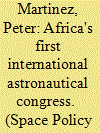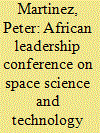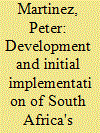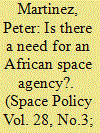|
|
|
Sort Order |
|
|
|
Items / Page
|
|
|
|
|
|
|
| Srl | Item |
| 1 |
ID:
111265


|
|
|
|
|
| Publication |
2012.
|
| Summary/Abstract |
The 62nd International Astronautical Congress (IAC), held in Cape Town from 3 to 7 October 2011, was a significant milestone in the development of the African space arena. The recent emergence of a number of African countries as space actors provided fertile ground for engagement with the global space community through the medium of an IAC. A large number of space actors, in Africa and globally, coordinated their activities during the triennium 2009-2011 to build up to this historic first IAC in Africa. This paper discusses the main highlights of the congress and its immediate and potential long-term impact on the development of the African space arena.
|
|
|
|
|
|
|
|
|
|
|
|
|
|
|
|
| 2 |
ID:
111261


|
|
|
|
|
| Publication |
2012.
|
| Summary/Abstract |
The African Leadership Conference on Space Science and Technology (known as "the ALC") is a regional conference to promote intra-African cooperation in the uses of space science and technology to support Africa's development. The first such conference was held in 2005 in Abuja, Nigeria, followed by South Africa (2007), Algeria (2009) and Kenya (2011). The ALC has come to be regarded as a representative African forum in the global space community. This paper provides an overview of the structure and activities of the ALC and presents the highlights and outcomes of the first four conferences and their contribution to shaping the development of the African space arena. The paper concludes with an analysis of the challenges facing the ALC and some proposed measures to enhance its effectiveness.
|
|
|
|
|
|
|
|
|
|
|
|
|
|
|
|
| 3 |
ID:
132721


|
|
|
|
|
| Publication |
2014.
|
| Summary/Abstract |
space systems play an important role in sustaining the development, prosperity and security of many nations. As more nations become critically reliant on space systems, questions of maintaining safety and strategic stability in outer space have come to the fore. Transparency and Confidence-Building Measures (TCBMs) for outer space activities have an important role to play in providing clarity about the intentions of States and in articulating norms of behaviour in outer space. TCBMs take several forms. They may be the elaboration of basic principles related to the exploration and use of outer space, political measures related to establishing norms of conduct, information-sharing activities to improve the transparency of outer space activities, operational practices which demonstrate a commitment to mutual cooperation in outer space, or consultative mechanisms. We present an analytical framework for evaluating potential TCBMs and illustrate the application of this framework to examples of potential operational, regulatory, treaty-based and declaratory TCBMs.
|
|
|
|
|
|
|
|
|
|
|
|
|
|
|
|
| 4 |
ID:
157175


|
|
|
|
|
| Summary/Abstract |
South Africa is one of the few countries in Africa that has codified a national space policy. South Africa's first public national space policy was adopted in 2009. The policy has given direction and purpose to the country's recent space activities. Prior to this, space activities in South Africa were disparate and uncoordinated. Because space policy is not a primary policy issue, but rather an ancillary policy issue, the development of space policy had to be couched in terms that made it clear to policymakers exactly how space activities would contribute to national development and other policy priorities. This required building capacity in government to engage in policy discussions around these issues. We describe the process that was followed to raise the political profile of space affairs to the point that it became a policy issue for the South African government. The policy development narrative is arranged in a series of ten goals that were addressed during the policy development process. These goals speak to how one can address the political and systemic challenges of space policy formulation in the context of an emerging space nation that is also a developing country. The goals may thus be of interest to other emerging space nations at a similar stage in their development.
|
|
|
|
|
|
|
|
|
|
|
|
|
|
|
|
| 5 |
ID:
120091


|
|
|
|
|
| Publication |
2012.
|
| Summary/Abstract |
Over the past few years, the view has been expressed in some quarters that Africa should establish a continental space agency. Various arguments are advanced for this, but they are generally not compelling and rely mostly on pointing to the existence of other regional space cooperation organisations, or to benefits that are debatable. The article considers these arguments and concludes that there is an insufficient case for the establishment of an African space agency at this point in the development of the space arena in Africa. Instead, greater emphasis should be placed on strengthening nascent national space programmes, fostering intra-regional cooperation and raising the profile of space activities in Africa's national and regional political structures.
|
|
|
|
|
|
|
|
|
|
|
|
|
|
|
|
| 6 |
ID:
094093


|
|
|
|
|
| Publication |
2010.
|
| Summary/Abstract |
The international community is entering an era of shared global utilities from space and is increasingly reliant on space systems and activities that support a myriad of applications and utilities on Earth. A growing number of states are seeking to develop or extend their space capabilities. At the same time, a variety of non-state actors are also extending their involvement in space activities. The United Nations is the principal inter-governmental forum to deal with various space issues of global importance. Moreover, the United Nations system itself has become increasingly reliant on space systems for its day-to-day operations. In order for the United Nations to play its necessary role in the space arena, it will need to be supported by a space policy. A United Nations space policy would provide over-arching guidance on space activities for UN stakeholders in the space arena; it would inform UN participation in space activities and would promote improved coordination and cooperative governance of outer space activities. A world without a common UN space policy will not be able to respond to the challenges of the rapidly evolving space arena in the 21st century.
|
|
|
|
|
|
|
|
|
|
|
|
|
|
|
|
| 7 |
ID:
169293


|
|
|
|
|
| Summary/Abstract |
The Outer Space Treaty (OST), which entered into force on 10th October 1967, has served as a foundation of international space law since the second decade of the Space Age. To mark the 50th anniversary of the Treaty's entry into force, a special panel event was organized during the 68th International Astronautical Congress held in Adelaide, Australia, from 25th–29th September 2017. The authors of this viewpoint were invited to share their perspectives on the governance framework for outer space activities underpinned by the OST and to reflect on the prospects for the future of global space governance, and the opportunities presented by UNISPACE+50, which will mark the 50th anniversary of the first UNISPACE conference in June 2018. This viewpoint begins with a retrospective reflection of 3 panellists on the contributions of the OST to global space governance in the past 50 years and the challenges facing the OST at present. The fourth reflection focuses on the potentials of UNISPACE+50 in 2018 to strengthen global cooperative space governance for the next 50 years of the space age.
|
|
|
|
|
|
|
|
|
|
|
|
|
|
|
|
|
|
|
|
|